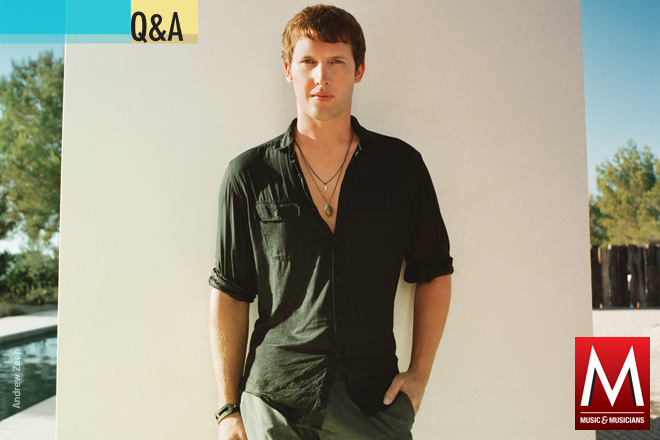JAMES BLUNT
Pop troubadour goes looking for trouble—and discovers electricity
James Blunt’s first two albums, Back to Bedlam and All the Lost Souls, catapulted him to stardom with hits like “You’re Beautiful” and “1973.” Those discs also cast him in the guise of sensitive pop crooner. With his new album, Some Kind of Trouble, the former British Army officer shakes free of his balladeer reputation and unleashes an upbeat collection of electric pop rockers. Blunt, 35, spoke with us about changing his musical direction, rediscovering the electric guitar and the impact of a famous mentor.
Why is the record so upbeat?
That was something that happened naturally, and something that happened more for myself than for my audience. Having made two melancholy albums, I wouldn’t have enjoyed making another. I wanted to take a different perspective on life, and take a different approach musically as well. This time around I wrote on electric guitar, which is what I learned to play on. I wrote the earlier albums on an acoustic. Instead of being a troubadour, this time I wrote as if I were the frontman for a band.
Was any one song a touchstone?
“Dangerous.” I had stepped away from music and was just hanging out with friends—an important thing for a songwriter to do. It’s important to experience life moments, both shallow and deep. Then I met Steve Robson, who became my co-writer and producer. We went out for a beer and ended up in the studio, where we wrote “Dangerous.” It sounded exciting and upbeat. That was the stepping stone to everything else.
You’ve said the record captures the mood of the ’80s. How so?
I didn’t necessarily mean the music of the ’80s, although I can hear hints of ’80s guitar bands in some songs. I was referring to the sense of optimism that existed in that decade. In the Western world, there was a belief we could achieve anything by working together. Since then, especially in Britain, a sense of cynicism has taken hold. I still feel a kinship with teenage optimism. And because I come from an Army background, I recognize that “no” is not a useful word.
Has that training come in handy?
It helped me to remain levelheaded when I began to get some attention. To be thrown into an industry that’s not always focused on the purity of the music, but instead sometimes on money, image and fashion, didn’t come naturally to me. It took time, but I get it now, and I’m relaxed about those things. I focus on what I know and love, which is to make good music.
You’re close to Elton John, correct?
I’ve been very lucky that he has helped me from the start. He took me out on tour and still calls me up to point me in the right direction, or to say a good word. He’s been through the wars himself, and he’s come out of them as an incredibly generous person. He’s the first to admit he’s made mistakes, but he’s also learned from them. And he’s still making fantastic music.
Your college thesis was titled The Commodification of Image: Production of a Pop Idol.
Yes. (laughs) You could tell even then what I wanted for a career. But “pop idol” meant something different back then. It wasn’t like American Idol, which has altered people’s perception of the phrase. I was fascinated by the music business’s obsession with selling a brand or an image. But I was also disenchanted by that, which is why I write songs that really mean something to me. I want my songs to be open and honest and true.
–Russell Hall




comment closed